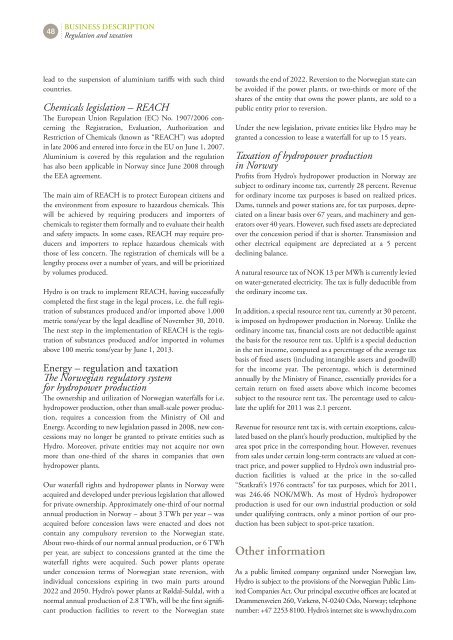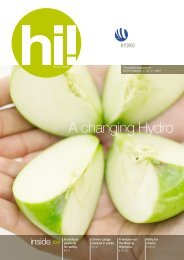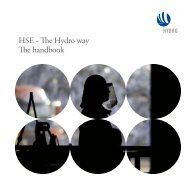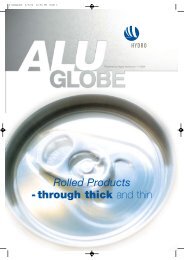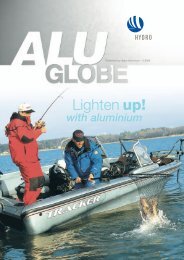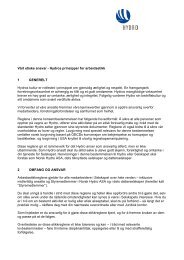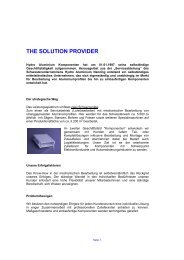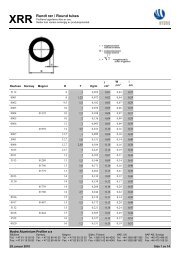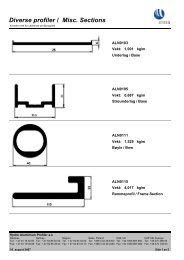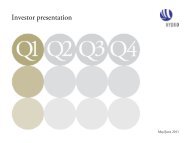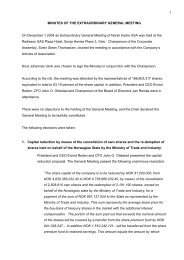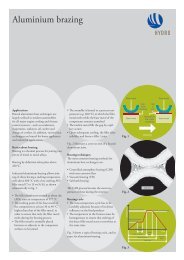Hydro Annual Report 2011b
Hydro Annual Report 2011b
Hydro Annual Report 2011b
You also want an ePaper? Increase the reach of your titles
YUMPU automatically turns print PDFs into web optimized ePapers that Google loves.
48<br />
BusIness DesCrIptIon<br />
Regulation and taxation<br />
lead to the suspension of aluminium tariffs with such third<br />
countries.<br />
Chemicals legislation – REACH<br />
The European Union Regulation (EC) No. 1907/2006 concerning<br />
the Registration, Evaluation, Authorization and<br />
Restriction of Chemicals (known as “REACH”) was adopted<br />
in late 2006 and entered into force in the EU on June 1, 2007.<br />
Aluminium is covered by this regulation and the regulation<br />
has also been applicable in Norway since June 2008 through<br />
the EEA agreement.<br />
The main aim of REACH is to protect European citizens and<br />
the environment from exposure to hazardous chemicals. This<br />
will be achieved by requiring producers and importers of<br />
chemicals to register them formally and to evaluate their health<br />
and safety impacts. In some cases, REACH may require producers<br />
and importers to replace hazardous chemicals with<br />
those of less concern. The registration of chemicals will be a<br />
lengthy process over a number of years, and will be prioritized<br />
by volumes produced.<br />
<strong>Hydro</strong> is on track to implement REACH, having successfully<br />
completed the first stage in the legal process, i.e. the full registration<br />
of substances produced and/or imported above 1,000<br />
metric tons/year by the legal deadline of November 30, 2010.<br />
The next step in the implementation of REACH is the registration<br />
of substances produced and/or imported in volumes<br />
above 100 metric tons/year by June 1, 2013.<br />
Energy – regulation and taxation<br />
The Norwegian regulatory system<br />
for hydropower production<br />
The ownership and utilization of Norwegian waterfalls for i.e.<br />
hydropower production, other than small-scale power production,<br />
requires a concession from the Ministry of Oil and<br />
Energy. According to new legislation passed in 2008, new concessions<br />
may no longer be granted to private entities such as<br />
<strong>Hydro</strong>. Moreover, private entities may not acquire nor own<br />
more than one-third of the shares in companies that own<br />
hydropower plants.<br />
Our waterfall rights and hydropower plants in Norway were<br />
acquired and developed under previous legislation that allowed<br />
for private ownership. Approximately one-third of our normal<br />
annual production in Norway – about 3 TWh per year – was<br />
acquired before concession laws were enacted and does not<br />
contain any compulsory reversion to the Norwegian state.<br />
About two-thirds of our normal annual production, or 6 TWh<br />
per year, are subject to concessions granted at the time the<br />
waterfall rights were acquired. Such power plants operate<br />
under concession terms of Norwegian state reversion, with<br />
individual concessions expiring in two main parts around<br />
2022 and 2050. <strong>Hydro</strong>’s power plants at Røldal-Suldal, with a<br />
normal annual production of 2.8 TWh, will be the first significant<br />
production facilities to revert to the Norwegian state<br />
towards the end of 2022. Reversion to the Norwegian state can<br />
be avoided if the power plants, or two-thirds or more of the<br />
shares of the entity that owns the power plants, are sold to a<br />
public entity prior to reversion.<br />
Under the new legislation, private entities like <strong>Hydro</strong> may be<br />
granted a concession to lease a waterfall for up to 15 years.<br />
Taxation of hydropower production<br />
in Norway<br />
Profits from <strong>Hydro</strong>’s hydropower production in Norway are<br />
subject to ordinary income tax, currently 28 percent. Revenue<br />
for ordinary income tax purposes is based on realized prices.<br />
Dams, tunnels and power stations are, for tax purposes, depreciated<br />
on a linear basis over 67 years, and machinery and generators<br />
over 40 years. However, such fixed assets are depreciated<br />
over the concession period if that is shorter. Transmission and<br />
other electrical equipment are depreciated at a 5 percent<br />
declining balance.<br />
A natural resource tax of NOK 13 per MWh is currently levied<br />
on water-generated electricity. The tax is fully deductible from<br />
the ordinary income tax.<br />
In addition, a special resource rent tax, currently at 30 percent,<br />
is imposed on hydropower production in Norway. Unlike the<br />
ordinary income tax, financial costs are not deductible against<br />
the basis for the resource rent tax. Uplift is a special deduction<br />
in the net income, computed as a percentage of the average tax<br />
basis of fixed assets (including intangible assets and goodwill)<br />
for the income year. The percentage, which is determined<br />
annually by the Ministry of finance, essentially provides for a<br />
certain return on fixed assets above which income becomes<br />
subject to the resource rent tax. The percentage used to calculate<br />
the uplift for 2011 was 2.1 percent.<br />
Revenue for resource rent tax is, with certain exceptions, calculated<br />
based on the plant’s hourly production, multiplied by the<br />
area spot price in the corresponding hour. However, revenues<br />
from sales under certain long-term contracts are valued at contract<br />
price, and power supplied to <strong>Hydro</strong>’s own industrial production<br />
facilities is valued at the price in the so-called<br />
“Statkraft’s 1976 contracts” for tax purposes, which for 2011,<br />
was 246.46 NOK/MWh. As most of <strong>Hydro</strong>’s hydropower<br />
production is used for our own industrial production or sold<br />
under qualifying contracts, only a minor portion of our production<br />
has been subject to spot-price taxation.<br />
other information<br />
As a public limited company organized under Norwegian law,<br />
<strong>Hydro</strong> is subject to the provisions of the Norwegian Public Limited<br />
Companies Act. Our principal executive offices are located at<br />
Drammensveien 260, vækerø, N-0240 Oslo, Norway; telephone<br />
number: +47 2253 8100. <strong>Hydro</strong>’s internet site is www.hydro.com


